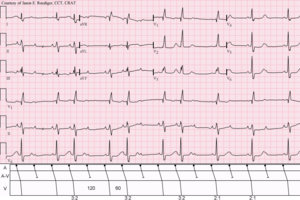Atrioventricular block
| Atrioventricular block | |
|---|---|
| Classification and external resources | |
| Specialty | cardiology |
| ICD-10 | I44.0-I44.3 |
| ICD-9-CM | 426.0-426.1 |
| eMedicine | med/189 |
| MeSH | D054537 |
Atrioventricular block (AV block) is a type of heart block in which the conduction between the atria and ventricles of the heart is impaired. Under normal conditions, the sinoatrial node (SA node) in the atria sets the pace for the heart, and these impulses travel down to the ventricles. In an AV block, this message does not reach the ventricles or is impaired along the way. The ventricles of the heart have their own pacing mechanisms, which can maintain a lowered heart rate in the absence of SA stimulation.
The causes of pathological AV block are varied and include ischaemia, infarction, fibrosis or drugs, and the blocks may be complete or may only impair the signaling between the SA and AV nodes. Certain AV blocks can also be found as normal variants, such as in athletes or children, and are benign.[1] Strong vagal stimulation may also produce AV block. The cholinergic receptor types affected are the muscarinic receptors.
There are three types:
- First-degree atrioventricular block - PR interval greater than 0.20sec.
- Second-degree atrioventricular block - Type 1 (aka Mobitz 1, Wenckebach): Progressive prolongation of PR interval with dropped beats (the PR interval gets longer and longer; finally one beat drops) . Type 2 (aka Mobitz 2, Hay): PR interval remains unchanged prior to the P wave which suddenly fails to conduct to the ventricles.
- Third-degree atrioventricular block - No association between P waves and QRS complexes.

-

Sinus rhythm with acute inferior infarction complicated by Type I A-V block manifest in the form of 5:4 Wenckebach periods; R-P/P-R reciprocity.
-

Sinus rhythm (rate = 100/min) with 3:2 and 2:1 Type II A-V block; RBBB
-

Sinus tachycardia with complete A-V block and resulting junctional escape